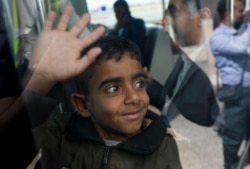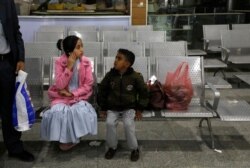A medical airbridge from Yemen to Jordan set up in the past two weeks has delivered 29 Yemenis, who are now being treated in Jordanian hospitals.
The United Nations flights are viewed as a humanitarian breakthrough in the five-year conflict afflicting the Arab world’s poorest country, where hospitals have been bombed and medicine is scarce.
The Yemeni patients are being aided by the World Health Organization and the non-governmental International SOS group.
Dubbed, “mercy flights,” Yemeni medical patients — ages five to well into their 50s — from Houthi rebel-held areas suffering from congenital heart disease, kidney failure, brain tumors and various cancers, are in Amman for treatment.
U.N. Envoy to Yemen Martin Griffiths said, so far, two flights have transported patients to “receive life-saving medical care currently unavailable in Yemen.”
Shuhd al-Harethi is a 13-year-old from Yemen’s capital, Sana’a, dressed in a pastel hospital gown. At times, she must also wear an oxygen mask over her chestnut brown hair because of her congenital heart problem first diagnosed at 9-months-old.
Shuhd’s father, Khalid, said there was no medical treatment available all these years for his daughter in Yemen. Desperate, some five years ago, he took her to Saudi Arabia in search of a heart operation. But the hospital there couldn’t perform it. Meanwhile, the war broke out pitting the Saudi-led coalition supporting Yemen’s government against the Iranian-backed Houthi rebels. The Saudi doctors told him to leave and take Shuhd back to Yemen.
Shuhd is expected to undergo heart surgery Saturday at Amman’s Specialty Hospital, where Dr. Mohamed Azzoqa, who heads the intensive care and cardiac care unit, will oversee her recovery.
"All of her veins are supposed to drain on the right side, but they are draining on the left side instead of the right side,” Azzoqa said. “We call it a corrective surgery. It needs a multi-disciplinary team."
Other Yemenis, like nine-year-old Aiman Senan, are scheduled for orthopedic surgery next week to correct a curvature of the spine. Again, such surgery is unavailable in Yemen.
The Houthi rebel-run health ministry said 32,000 Yemenis are in need of urgent medical and surgical intervention, such as kidney transplants and heart surgeries.
Those fortunate enough to travel for life-saving treatment said they signed up with the World Health Organization for consideration. All who have traveled so far are dealing with chronic conditions and are not those requiring medical help due to injuries resulting from the conflict.
Yemen has been called the world's greatest humanitarian emergency. For two years, the United Nations has been negotiating for permission to evacuate Yemenis who need urgent medical care.
Major donors and some of the world's largest aid agencies are meeting in Brussels Thursday to try to put together a collective response to what is being widely described as unprecedented and unacceptable obstruction by Houthi authorities, who control large portions of northern Yemen.






